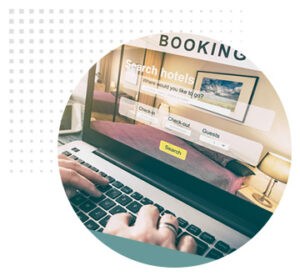10-Step Checklist to Increase Direct Bookings in your Hotel
While third-party booking sites and OTAs can form a valuable part of the marketing mix by increasing brand reach and filling shoulder times, direct bookings offer a wealth of benefits – the most obvious being the opportunity to improve margins which increase RevPAR, but also providing the opportunity to drive longer-term loyalty for your hotel.
To maximise direct bookings in your hotel and give your bottom line a boost, check out our handy checklist below:
-
Ensure your website is user-friendly
Is your website helping or hindering the number of direct bookings you receive? Run through your booking journey as if you were a guest, evaluating how easy it is to browse through your offering, check availability and make a booking. Some key things to look out for here are having too many steps in the booking process, unclear language, complicated systems – or even if it just takes too long to complete!
-
 Provide up-to-date information
Provide up-to-date information
Are all the facilities you offer easily available to view and do images reflect how things currently are? If you have rooms or facilities that are currently unavailable, make sure this is clearly communicated on your website and across any other sources of information to avoid any guest frustrations that may result in disappointment on arrival and damage your brand.
-
Display real-time availability of rooms
Guests are looking for the peace of mind of knowing their room reservation is secured immediately at the point of booking. Make sure room availability and rates are correct and in-line with those offered on third party sites. This can be achieved easily by integrating your hotel’s property management system (PMS) with your website’s booking engine via a channel manager, allowing you to centrally manage your rooms across all channels from one platform, and avoid overbooking.
-
Offer exclusive deals for direct bookings
Offer preferential rates or extra incentives to encourage guests to book via your website. Not only does this entice guests away from OTAs into booking with you direct, you’ll also be able to capture valuable information, increase opportunities for upselling, and provide added incentives for them to book direct in the future too.
-
 Highlight how you keep customer information
Highlight how you keep customer information
Trust is a hot topic amongst consumers at the moment, and if guests are confident that you are keeping their information safe, they are more likely to trust your direct booking process. You should clearly communicate how any data is being stored, as well as what you’ll be using it for, demonstrating the value in sharing their data to your guests.
-
Communicate with guests
42% of hotel guests say a high level of responsiveness to enquiries and bookings would encourage them to book direct, according to our research, so building a dialogue with guests in the early stages is vital.
-
Send confirmation emails and keep the conversation going
Further to the above, make the most of every opportunity to communicate with guests through confirmation emails, reminder messages and offers. Not only will you build trust and provide your guests with peace of mind prior to arrival, these communications also provide valuable opportunities for upselling of experiences and F&B, so make sure you’re utilising these touchpoints to their full potential!
-
 Reward Loyalty
Reward Loyalty
29% of hotel guests say they are interested in hospitality loyalty schemes that offer personalised rewards. Assess your current loyalty offering – does it meet this demand? If not, the data you gather from direct bookings can help you to develop this by analysing which promotions are working and which could use some refinement. For example, our recent research found 4 in 5 hotel guests said a discount on a return visit would encourage them to book a return trip. Use this insight to deliver tailored messaging that drives repeat custom and direct bookings.
-
A booking button on social media
43% of hotel users agree that a button to book a hotel directly from social media accounts would make their booking journey easier. Not only does this help to provide a more convenient journey for many bookers, particularly amongst younger generations, but will also help you drive more bookings and access new groups of guests.
-
Encourage guests to leave reviews
Whilst personal recommendations from friends remains the top source of information for guests when choosing a hotel to stay in, online reviews play a crucial role, with 98% of consumers saying reviews influence their choice of hotel. Common platforms for leaving a review include TripAdvisor and Google, however your own website and social media are also popular places guests go to when looking to leave a review. Sending an email to those who have booked directly with an incentive to leave a review is an effective way of increasing your review presence on these platforms.
